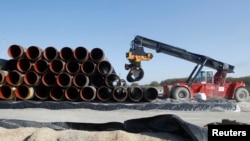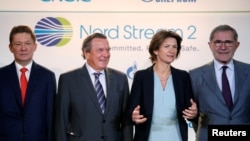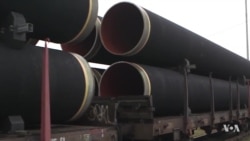A number of eastern European states have ramped up their opposition to a new gas pipeline linking Russia with Germany.
The Nord Stream 2 project will bring Russian gas directly to Western Europe, but critics say it will increase dependence on Russia and enrich its state-owned energy firms, at a time when Moscow stands accused of undermining European security.
The $11 billion, 1,225-kilometer pipeline is on schedule for completion next year. It is a private project backed by Russian state-owned Gazprom and five energy companies from Germany, France, Britain and the Netherlands. It also has the strong backing of the German and Russian governments.
“We support the implementation of this project which is undoubtedly, absolutely free from politics. This is a purely economic and moreover purely commercial project,” Russian President Vladimir Putin told reporters after meeting the Austrian chancellor, Sebastian Kurz, last week in Moscow. Kurz also offered his support for the project.
Doing business with Putin
Many eastern states, however, say Europe should not be engaged in big business with President Putin. Some of the most vocal critics have been the Baltic states of Estonia, Latvia and Lithuania, whose foreign ministers traveled to Washington last week to meet Secretary of State Rex Tillerson.
“Security these days is increasingly indivisible. There’s no clear division between internal and external security and also geographically,” Estonian Foreign Minister Sven Mikser told reporters in Washington ahead of the meeting.
The United States is opposed to Nord Stream 2, having sanctioned Russian companies over Moscow’s annexation of Crimea, along with foreign companies involved in Russian energy exploration. So far, those sanctions don’t affect the new pipeline.
The European Commission also opposes the project but says there are no legal grounds to prevent the private investment from going ahead.
WATCH: Europe Split on Nord Stream 2 Pipeline as US Warns Against Dependence on Russian Gas
Softening sanctions
Opponents fear any additional revenues for Russia from Nord Stream 2 would soften the impact of sanctions. Many Eastern European states also question whether the new pipeline will benefit them economically, says Noah Gordon, analyst at the Center for European Reform, a London-based research group.
“There could be bottlenecks through central Europe and Eastern Europe, and those places could see prices rise and they might be more exposed to a Russian political gas cutoff. Ukraine would lose about $2 billion a year in transit fees.”
Currently, more than half of Russian gas exports to Europe are routed through Ukraine. Supporters of Nord Stream 2 say it would increase security of supply, citing recent price disputes between Moscow and Kyiv.
The EU hopes to mitigate the risk of increased dependence on Russia by investing in connecting pipelines across European borders.
“The goal is a resilient gas market where gas flows freely across borders,” Gordon said. “For two years, Ukraine hasn’t bought any gas from Russia. Instead they buy gas, Russian gas usually, indirectly from European traders like Germany, like the Dutch. So if the European gas market was in a strong enough state and if Europe was more energy efficient and used less gas, Russian or otherwise, Russia wouldn’t be able to meddle or use gas as a weapon ever again.”
Poland and Lithuania, which vehemently oppose Nord Stream 2, have built terminals for liquefied natural gas, or LNG. The United States wants to boost its LNG exports to Europe.
Both Europe and the U.S. hope that a diversified supply will help reduce Russia’s ability to use gas as a political weapon.







